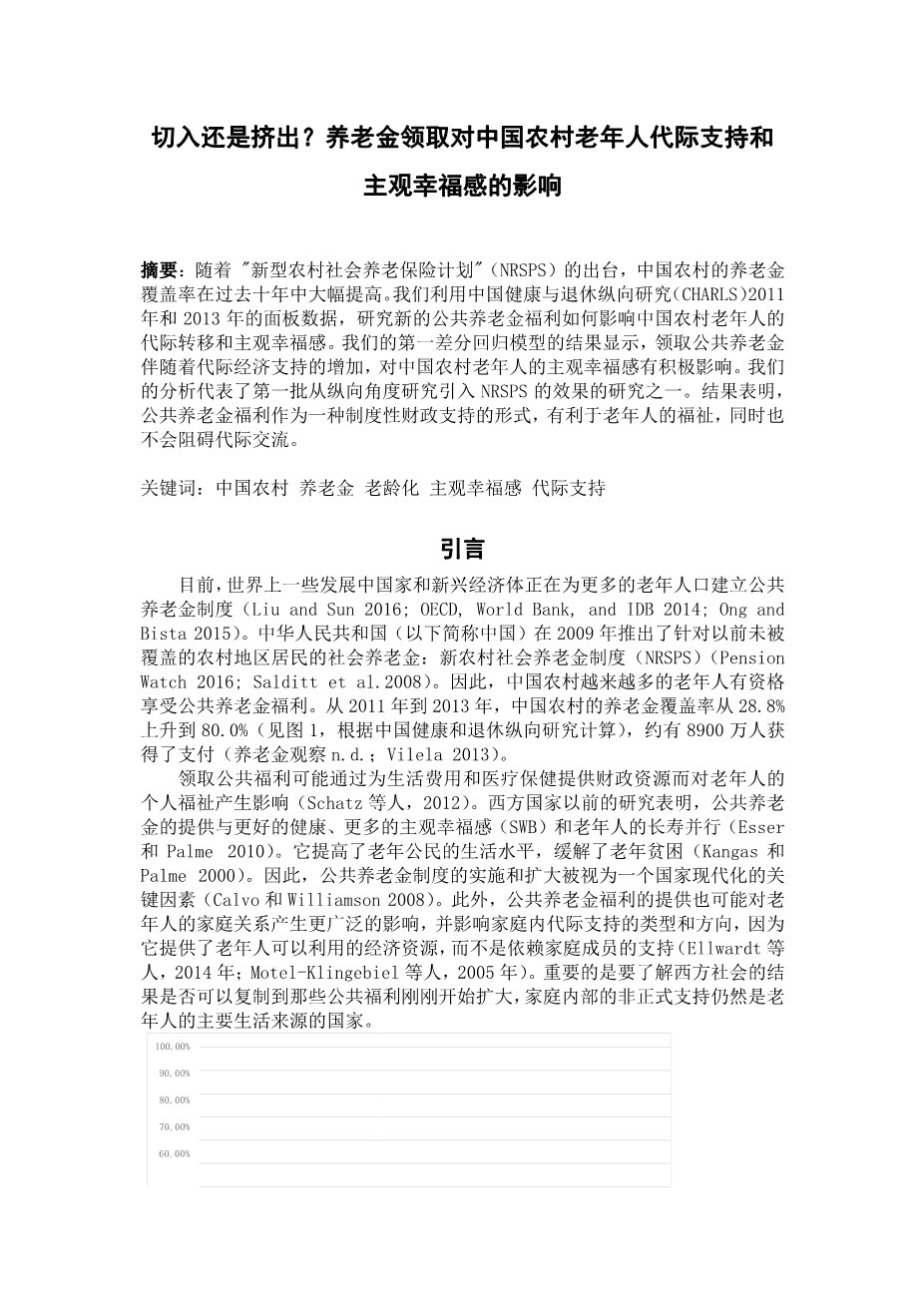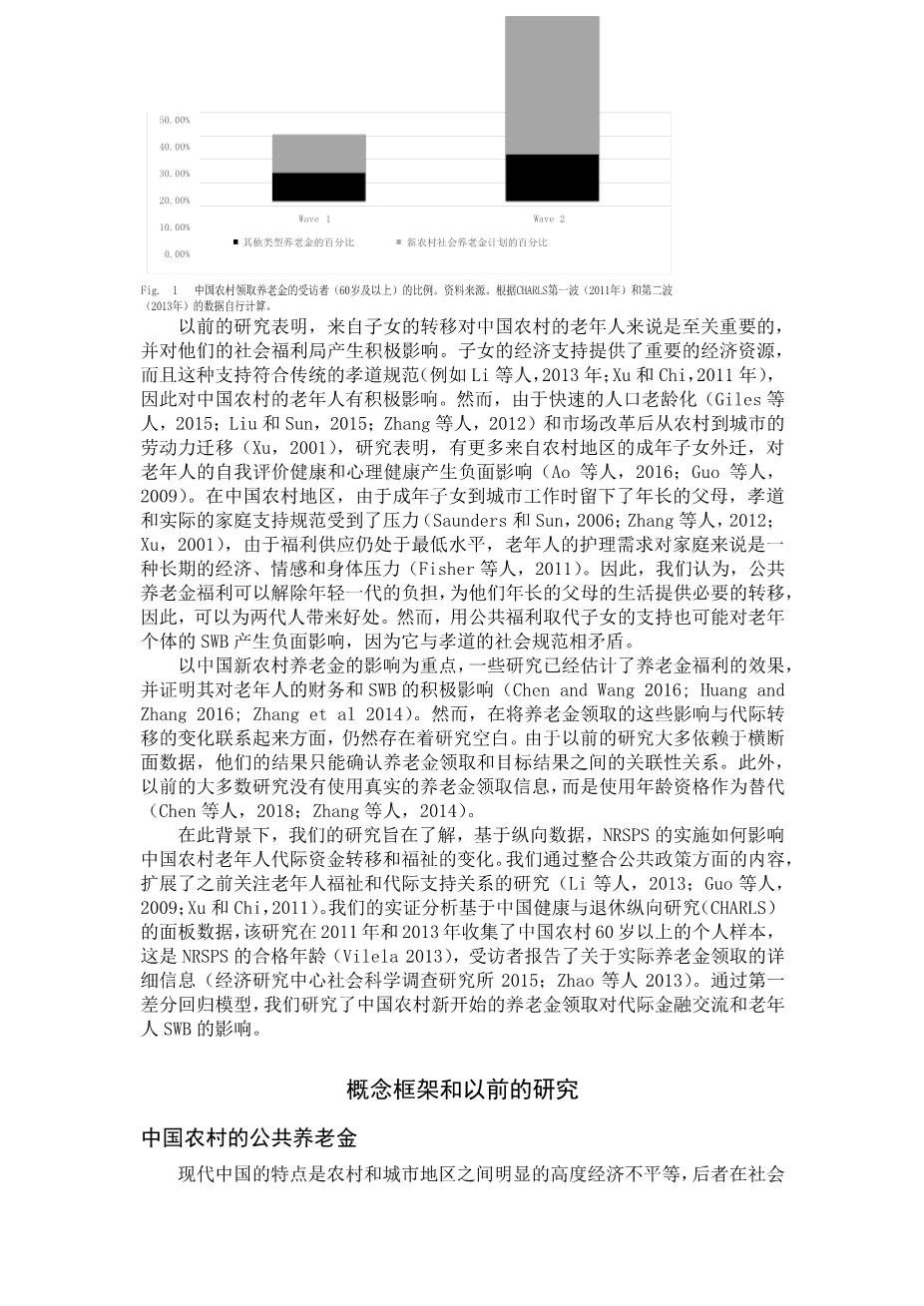Journal of Cross-Cultural Gerontology (2021) 36:139–154
https://doi.org/10.1007/s10823-020-09422-8
ORIGINAL ARTICLE
Chipping In or Crowding-Out? The Impact of Pension
Receipt on Older Adultsrsquo; Intergenerational Support
and Subjective Well-Being in Rural China
Pei-Chun Ko 1 amp; Katja Mouml;hring2
Accepted: 28 December 2020 /Published online: 25 March 2021
# The Author(s), under exclusive licence to Springer Science Business Media, LLC, part of Springer Nature 2021
Abstract
With the introduction of the New Rural Social Pension Scheme (NRSPS), pension coverage in rural China has increased substantially during the last decade. We investigate how the new public pension benefits influence intergenerational transfers and subjective well-being of older adults in rural China using panel data from the 2011 and 2013 waves of the China Health and Retirement Longitudinal Study (CHARLS). The results of our first-difference regression models show that receiving a public pension goes along with an increase in intergenerational financial support and has a positive impact on the subjective well-being of older adults in rural China. Our analysis represents one of the first studies examining the effects of the introduction of the NRSPS from a longitudinal perspective. The results demonstrate that public pension benefits as a form of institutional financial support are beneficial to the well-being of older adults, while they do not hinder intergenerational exchange.
Keywords Rural China . Pension . Aging . Subjective well-being . Intergenerational support
Introduction
A number of developing and emerging economies around the world are currently in the process of establishing public pension systems for a larger share of the elderly population (Liu and Sun 2016; OECD, World Bank, and IDB 2014; Ong and Bista 2015). The Peoplersquo;s Republic of China (China, hereafter), launched a social pension targeted at previously non- covered residents in rural areas in 2009: the New Rural Social Pension System (NRSPS)
* Pei-Chun Ko pcko@suss.edu.sg
1
2
Centre for University Core, Singapore University of Social Sciences, 463 Clementi Road, Singapore 599494, Singapore
School for Social Sciences, University of Mannheim, Mannheim, Germany
(Pension Watch 2016; Salditt et al. 2008). As a consequence, a growing number of older adults in rural China has become eligible for public pension benefits. From 2011 to 2013, the pension coverage in rural China rose from 28.8 to 80.0% (see Fig. 1, calculations based on the China Health and Retirement Longitudinal Study) and about 89 million people have received payment (Pension Watch n.d.; Vilela 2013).
The receipt of public benefits may have an effect on the personal wellbeing of elderly through providing financial resources for living expenses and health care (Schatz et al. 2012). Previous research in Western countries has demonstrated that public pension provision parallels better health, increased subjective wellbeing (SWB), and longevity of older adults (Esser and Palme 2010). It raises older citizensrsquo; living standard and alleviates old age poverty (Kangas and Palme 2000). Therefore, the implementation and expansion of public pension systems is seen as a key factor in a countryrsquo;s modernization (Calvo and Williamson 2008). In addition, the provision of public pension benefits may also have wider implications on the family relations of older adults and affect the types and the directions of intergenerational support within families because it provides economic resources that older adults can utilize instead of relying on support by family members (Ellwardt et al. 2014; Motel-Klingebiel et al. 2005). It is important to understand whether results from Western societies can be duplicated in countries where public welfare benefits are just starting to be expanded and informal support within the family is still the major source of subsistence for older adults.
Previous research has demonstrated that transfers from children are crucial for older adults
in rural China and have a positive influence on their SWB as childrenrsquo;s financial support provides crucial economic resources and such support is in line with the traditional norm of filial piety (e.g. Li et al. 2013; Xu and Chi 2011). However, due to rapid demographic aging (Giles et al. 2015; Liu and Sun 2015; Zhang et al. 2012) and labor migration from rural to urban areas after the market reform (Xu 2001), research has shown that having more out- migration of adult children from rural areas negatively affects self-rated health and mental health of older adults (Ao et al. 2016; Guo et al. 2009). The norm of filial piety and actual
|
100.00% 90.00% 80.00% 70.00% 60.00% 50.00% 40.00% 30.00% 20.00% 10.00% 0.00% |
||
|
Wave 1 % of other types of Pension |
Wave 2 % of New Rural Social Pension Scheme |
Fig. 1 Share of respondents (aged 60
剩余内容已隐藏,支付完成后下载完整资料


英语译文共 11 页,剩余内容已隐藏,支付完成后下载完整资料
资料编号:[590762],资料为PDF文档或Word文档,PDF文档可免费转换为Word
以上是毕业论文外文翻译,课题毕业论文、任务书、文献综述、开题报告、程序设计、图纸设计等资料可联系客服协助查找。


